#ecocounts
Photo
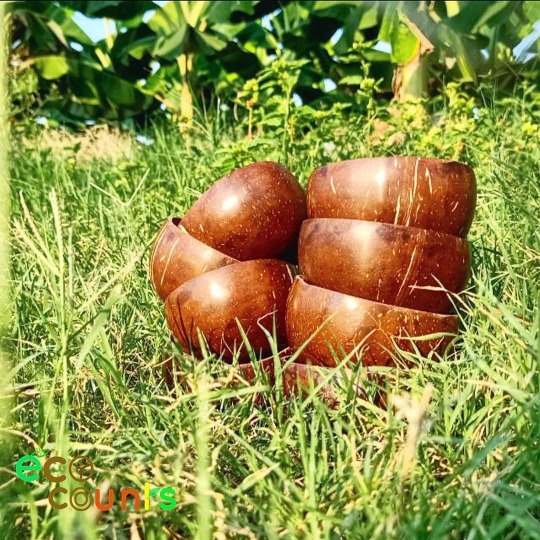
@ecocounts Coconut bowls are gifts🎁 from nature, handcrafted from real coconuts discarded as waste. With every use you save a coconut, help the environment and support rural craftspeople. ✋ These eco-friendly bowls are perfect for everything, from stir fry to smoothie bowl. Transport your whole family to a tropical paradise with every bite! Everything looks and tastes better from a Coconut Bowl! Follow us 👉@ecocounts to Make living sustainable... with @ecocounts . . . . #ecocounts #coconuts #cocobowls #sustainable #ecofriendlyproducts #sustainability #zerowaste #sustainableliving #handmade #ecofriendly #organic #ecoshop #sustainableproducts #recycle #plasticfree #plantbased #vegan #sustainabledesign #biodegradable #coconutbowl #shoplocal #coconutbowls #coconutproducts #circulareconomy #greeshopping #reducereuserecycle #instagood #supportfarmers #natureliving #ecostore (at Coimbatore, Tamil Nadu) https://www.instagram.com/p/CMbeb46A_QX/?igshid=1rp78jxc5wcub
#ecocounts#coconuts#cocobowls#sustainable#ecofriendlyproducts#sustainability#zerowaste#sustainableliving#handmade#ecofriendly#organic#ecoshop#sustainableproducts#recycle#plasticfree#plantbased#vegan#sustainabledesign#biodegradable#coconutbowl#shoplocal#coconutbowls#coconutproducts#circulareconomy#greeshopping#reducereuserecycle#instagood#supportfarmers#natureliving#ecostore
1 note
·
View note
Text
Cities are failing cyclists. Here’s what needs to change.
Amsterdam has gone to great lengths to establish its cycling infrastructure. ( Noralí Nayla/)
Roads can take up as much as one-third of land mass in some metro areas. During COVID-19 quarantine, these giant swaths of cities laid empty and largely unused. Those who did venture out—many to either to work in essential services or to access them—faced tough decisions about their mode of transit. Some risked the enclosed spaces of public transit or shelled out for ride-shares. In increasing numbers, though, Americans have hopped on bikes and headed out into the streets, whether their city’s infrastructure was prepared or not.
During the week of June 24, transportation monitoring service EcoCounter logged a 28-percent year-over-year increase in US bike ridership. Similarly, a May 2020 survey conducted by advocacy group People For Bikes of 11 major metro areas found that 55.8 percent of respondents were either changing their primary mode of transportation or halting their commutes altogether due to COVID-19. Nearly half of those polled also said they’re biking for exercise and recreation more. And of all respondents, 40.5 percent said they will bike or walk more often even after pandemic restrictions and considerations lift. Sales of both new and used velocipes also saw massive spikes in mid-to-late May.
Transit experts agree, however, that US cities are ill-equipped to handle this monumental surge in two-wheeled traffic. “I would say they are fine to terrible,” says Danny Harris, executive director of Transportation Alternatives, a nonprofit focused on helping communities shift away from car-based transit. In People For Bikes’s annual ranking of the best cities for cyclists, the top US town, San Louis Obibso, Calif., scored only a 3.5/5 for its velo-friendliness. The ratings consider five criteria: total ridership, safety, the strength of the road-and-trail networks, how well the systems reach diverse communities, and how quickly the municipality is enacting change.
The key factor in improving scores across the US is in investing in better bike networks—protected lanes, greenways, secure parking, and shared streets—says Kyle Wagenschutz, People For Bikes’s head of local innovation. “If you travel to any US city and you hop on a bike, more often than not you won’t easily be able to find the bicycle lanes and trails that connect you to the places you want to go,” he says. “If you got a rental car and plugged stuff into Google Maps, there’s a very seamless experience for you as a rider in that car.”
Improving the infrastructure has the potential to boost bikeability on all other metrics, specifically safety, ridership, and diverse reach. “Most US cities are scoring below the benchmark for network,” Wagenschutz says, “and we don’t think that cities can sustainably or substantially improve those other scores without that investment.”
In towns that are poster-children for pedal-powered infrastructure—like Bogota, Columbia, and Copenhagen, Denmark—cycling is part of a larger mindset. “It’s an entire way of thinking,” says TransAlt’s Harris, “you prioritize the residents, especially the most vulnerable ones.” Consider that, in spite of a general increase in bike-friendly infrastructure, 2018 (the last year for which the US Department of Transportation has compiled data) was the deadliest year on record for pedestrians and cyclists.
Spurred by COVID-19 and residents’ apprehension about the health risks inherent in mass transit, many cities implemented programs to clear more roadways for cyclists and pedestrians. Oakland, Calif., for example, rolled out a slow-streets program, which shut 74 miles of roads throughout the city. And New York City announced an initiative that would shut some 30 miles to traffic.
Yet critics say these efforts are only temporary measures, lacking the careful planning and community engagement that large-scale, long-term change demands. In many instances these open areas cluster in residential neighborhoods and don’t connect to a broader network that helps commuters get where they need to go. Transiting from a housing development at the edge of an urban area to a central business district, for example, might require a cyclist to negotiate heavily-trafficked expressways and crossings dominated by cars and trucks.
Without the safety and access to a connected network at the forefront, encouraging more pedalers onto the streets can be a disingenuous invitation. “There are still opportunities to turn these open-streets movements into something that could work for more people,” says Destiny Thomas, an urban planner and CEO and founder of The Thrivance Group, an organization that advocates for equitably reshaping the built environment to better serve Black and indigenous communities. “Black people have to travel for very far distances because of divestment in our communities,” she continues. “I’m not opposed to the repurposed space during this season, it’s how lazy we’ve been in identifying who these places are being restored for.”
To their credit, a handful of cities are taking a mindful approach to how they roll out open-street programs. Atlanta, Georgia, Thomas points out, has prioritized equity in its network planning, and even offered residents the chance to submit proposals and vote on how to spend transportation funds. And People For Bike’s Wagenschutz cites a plan in Austin, Texas, to dedicate two lanes of the South Congress Avenue thoroughfare to the center of the city to cyclists. (Across the pond, Paris and London have begun aggressively and broadly converting streets for bike-only traffic.)
In the near-term, these changes require relatively simple tweaks, such as the installation of tall white poles that divide cars from bike traffic or the placement of heavy modular barriers. But going forward, planners agree that investment in new infrastructure projects, like protected bike lanes, that will serve residents for decades to come requires thought and diligence. “We’ve got to be willing to revise what we’ve done,” Thomas says.
Bike-forward thinking should be broad, touching on all considerations that might keep a potential rider from hopping on. Questions of safety, space, and storage loom large for cyclists—both beginner and experienced. “The mission for cities who are looking to expand bicycling as an option is to focus on making bicycling an easy choice to make,” says Wagenschutz.
0 notes
Text
Cities are failing cyclists. Here’s what needs to change.
Amsterdam has gone to great lengths to establish its cycling infrastructure. ( Noralí Nayla/)
Roads can take up as much as one-third of land mass in some metro areas. During COVID-19 quarantine, these giant swaths of cities laid empty and largely unused. Those who did venture out—many to either to work in essential services or to access them—faced tough decisions about their mode of transit. Some risked the enclosed spaces of public transit or shelled out for ride-shares. In increasing numbers, though, Americans have hopped on bikes and headed out into the streets, whether their city’s infrastructure was prepared or not.
During the week of June 24, transportation monitoring service EcoCounter logged a 28-percent year-over-year increase in US bike ridership. Similarly, a May 2020 survey conducted by advocacy group People For Bikes of 11 major metro areas found that 55.8 percent of respondents were either changing their primary mode of transportation or halting their commutes altogether due to COVID-19. Nearly half of those polled also said they’re biking for exercise and recreation more. And of all respondents, 40.5 percent said they will bike or walk more often even after pandemic restrictions and considerations lift. Sales of both new and used velocipes also saw massive spikes in mid-to-late May.
Transit experts agree, however, that US cities are ill-equipped to handle this monumental surge in two-wheeled traffic. “I would say they are fine to terrible,” says Danny Harris, executive director of Transportation Alternatives, a nonprofit focused on helping communities shift away from car-based transit. In People For Bikes’s annual ranking of the best cities for cyclists, the top US town, San Louis Obibso, Calif., scored only a 3.5/5 for its velo-friendliness. The ratings consider five criteria: total ridership, safety, the strength of the road-and-trail networks, how well the systems reach diverse communities, and how quickly the municipality is enacting change.
The key factor in improving scores across the US is in investing in better bike networks—protected lanes, greenways, secure parking, and shared streets—says Kyle Wagenschutz, People For Bikes’s head of local innovation. “If you travel to any US city and you hop on a bike, more often than not you won’t easily be able to find the bicycle lanes and trails that connect you to the places you want to go,” he says. “If you got a rental car and plugged stuff into Google Maps, there’s a very seamless experience for you as a rider in that car.”
Improving the infrastructure has the potential to boost bikeability on all other metrics, specifically safety, ridership, and diverse reach. “Most US cities are scoring below the benchmark for network,” Wagenschutz says, “and we don’t think that cities can sustainably or substantially improve those other scores without that investment.”
In towns that are poster-children for pedal-powered infrastructure—like Bogota, Columbia, and Copenhagen, Denmark—cycling is part of a larger mindset. “It’s an entire way of thinking,” says TransAlt’s Harris, “you prioritize the residents, especially the most vulnerable ones.” Consider that, in spite of a general increase in bike-friendly infrastructure, 2018 (the last year for which the US Department of Transportation has compiled data) was the deadliest year on record for pedestrians and cyclists.
Spurred by COVID-19 and residents’ apprehension about the health risks inherent in mass transit, many cities implemented programs to clear more roadways for cyclists and pedestrians. Oakland, Calif., for example, rolled out a slow-streets program, which shut 74 miles of roads throughout the city. And New York City announced an initiative that would shut some 30 miles to traffic.
Yet critics say these efforts are only temporary measures, lacking the careful planning and community engagement that large-scale, long-term change demands. In many instances these open areas cluster in residential neighborhoods and don’t connect to a broader network that helps commuters get where they need to go. Transiting from a housing development at the edge of an urban area to a central business district, for example, might require a cyclist to negotiate heavily-trafficked expressways and crossings dominated by cars and trucks.
Without the safety and access to a connected network at the forefront, encouraging more pedalers onto the streets can be a disingenuous invitation. “There are still opportunities to turn these open-streets movements into something that could work for more people,” says Destiny Thomas, an urban planner and CEO and founder of The Thrivance Group, an organization that advocates for equitably reshaping the built environment to better serve Black and indigenous communities. “Black people have to travel for very far distances because of divestment in our communities,” she continues. “I’m not opposed to the repurposed space during this season, it’s how lazy we’ve been in identifying who these places are being restored for.”
To their credit, a handful of cities are taking a mindful approach to how they roll out open-street programs. Atlanta, Georgia, Thomas points out, has prioritized equity in its network planning, and even offered residents the chance to submit proposals and vote on how to spend transportation funds. And People For Bike’s Wagenschutz cites a plan in Austin, Texas, to dedicate two lanes of the South Congress Avenue thoroughfare to the center of the city to cyclists. (Across the pond, Paris and London have begun aggressively and broadly converting streets for bike-only traffic.)
In the near-term, these changes require relatively simple tweaks, such as the installation of tall white poles that divide cars from bike traffic or the placement of heavy modular barriers. But going forward, planners agree that investment in new infrastructure projects, like protected bike lanes, that will serve residents for decades to come requires thought and diligence. “We’ve got to be willing to revise what we’ve done,” Thomas says.
Bike-forward thinking should be broad, touching on all considerations that might keep a potential rider from hopping on. Questions of safety, space, and storage loom large for cyclists—both beginner and experienced. “The mission for cities who are looking to expand bicycling as an option is to focus on making bicycling an easy choice to make,” says Wagenschutz.
0 notes
Photo
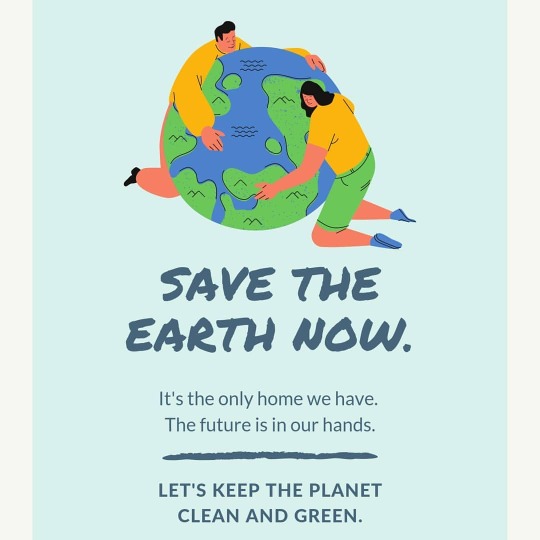
@ecocounts Planet Earth, our Mother Earth Counts. The little effort of everyone may change into a big one; save the earth. Saving of earth is the first and foremost responsibility of everyone, just do it! Stop polluting the earth and making it a heap of garbage! Let us plant more trees and make our earth green and clean. @ecocounts @ecocounts @ecocounts . . . . . #motherearth #earthcounts #ecocounts #savearth #onearth #lovearth #sustaibleliving #ecofriendlylifestyle #ecoproducts #nature #towardsnature #gogreen #environmentfriendly #responsiblebeing #livepeacefully (at EARTH) https://www.instagram.com/p/CL3lJVnA33D/?igshid=10sek7n3tulwu
#motherearth#earthcounts#ecocounts#savearth#onearth#lovearth#sustaibleliving#ecofriendlylifestyle#ecoproducts#nature#towardsnature#gogreen#environmentfriendly#responsiblebeing#livepeacefully
1 note
·
View note
Photo

@ecocounts Follow @ecocounts for eco-friendly products and environment friendly lifestyle @ecocounts . . . . #ecocounts #nature #ecoproducts #coconut #bamboo #coconutbowls #zerowaste https://www.instagram.com/p/CLJktwYhFS9/?igshid=rsdjg1r7wda4
1 note
·
View note
Photo
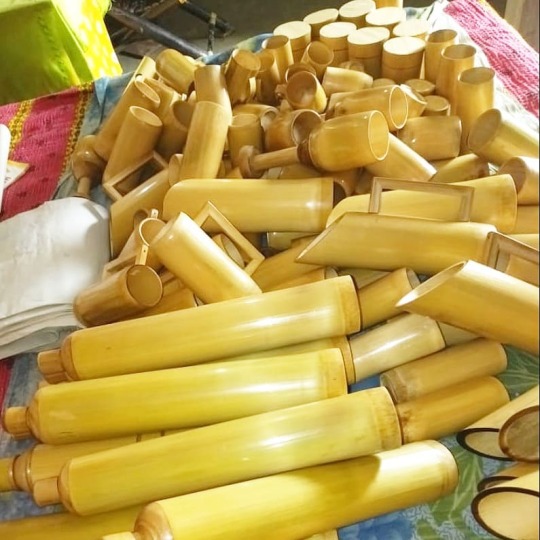
@ecocounts Bamboo products, Bamboo based kitchen wares. Eco packing of bulk orders📦. Support and encourage the use of natural products. 🍶🎍🍵 Have many health benefits, Biodegradable and environment friendly. 💚♻️✅ Easy for you and Nature Checkout www.ecocounts.com or DM for bulk orders. Follow us 👉 @ecocounts 💚 to make living sustainable... with @ecocounts @ecocounts @ecocounts ❤️Like💫Share💯 Comment 👫Tag your friends . . . . . #ecocounts #ecofriendlyproducts #bambooproducts #bambookitchenwares #ecoliving #bambooliving #e #zerowaste #zerowastelifestyle #towardsnature #sustainableliving #sustainability #greenshopping #boocups #boobottles #environmentfriendly #triballiving #zerowastetips #saynotoplastics #ecofriendlyliving #earthygoals #greenactivist #towardszerowaste #shoplocally #shopresposibly #handmade #reducereuserecycle #supportfarmers #bamboofarming #natureproducts https://www.instagram.com/p/CO92cpnJEx1/?igshid=8tihbc0yb1ne
#ecocounts#ecofriendlyproducts#bambooproducts#bambookitchenwares#ecoliving#bambooliving#e#zerowaste#zerowastelifestyle#towardsnature#sustainableliving#sustainability#greenshopping#boocups#boobottles#environmentfriendly#triballiving#zerowastetips#saynotoplastics#ecofriendlyliving#earthygoals#greenactivist#towardszerowaste#shoplocally#shopresposibly#handmade#reducereuserecycle#supportfarmers#bamboofarming#natureproducts
0 notes
Photo
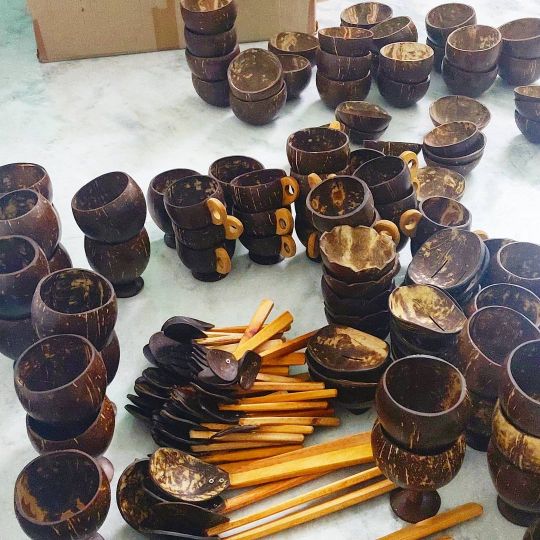
@ecocounts Working on our Orders, happy to serve customers who support eco-friendly products and encourage small businesses. We have our wide variety of Coconut shell products which interests you more towards cooking and serving food. 🥙🍧🍜☕ Coconut shell kitchen wares and cutleries 🧉🥣☕🥄🍴 are a healthier alternative as these are chemical free unlike other materials. Biodegradable and environment friendly. 💚♻️✅ DM for bulk orders, we do considerably less wholesale price according to the quantity. Follow us 👉 @ecocounts 💚 to make living sustainable... with @ecocounts @ecocounts @ecocounts ❤️Like💫Share💯 Comment 👫Tag your friends . . . . . #ecocounts #coconuts #coconutbowls #cococups #cocobowls #ecofriendlyproducts #zerowaste #zerowastelifestyle #towardsnature #sustainableliving #sustainability #coconutproducts #coconutshellproducts #environmentfriendly #naturelife #triballiving #zerowastetips #saynotoplastics #ecofriendlyliving #ecolife #earthygoals #greenactivist #towardszerowaste #shoplocally #shopresposibly #handmade #reducereuserecycle #supportfarmers #coconutfarming #natureproducts (at Coimbatore, Tamil Nadu) https://www.instagram.com/p/COPwk8aA3rI/?igshid=g3t88opcu1fr
#ecocounts#coconuts#coconutbowls#cococups#cocobowls#ecofriendlyproducts#zerowaste#zerowastelifestyle#towardsnature#sustainableliving#sustainability#coconutproducts#coconutshellproducts#environmentfriendly#naturelife#triballiving#zerowastetips#saynotoplastics#ecofriendlyliving#ecolife#earthygoals#greenactivist#towardszerowaste#shoplocally#shopresposibly#handmade#reducereuserecycle#supportfarmers#coconutfarming#natureproducts
0 notes
Photo
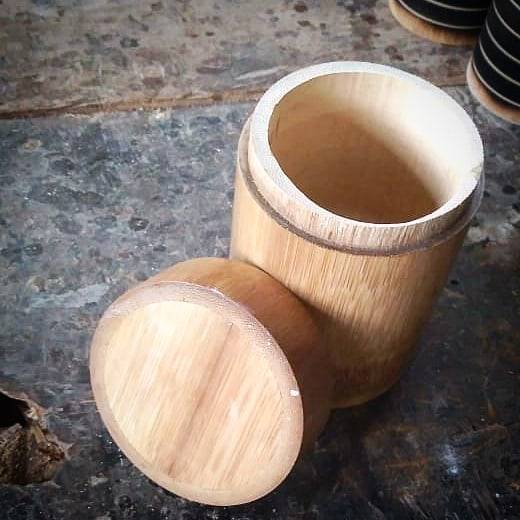
@ecocounts Bamboo containers, kitchen ware container. Bamboo products 🧺 Bamboo containers are a healthier 💪 alternative as these are chemical free unlike other materials. Big enough to hold your kitchen utilities, grains and powders. Biodegradable and environment friendly. 💚♻️✅ These cups are easy to clean for daily use, unbreakable and durable. Follow us 👉 @ecocounts 💚 to make living sustainable... with @ecocounts @ecocounts @ecocounts ❤️Like💫Share💯 Comment 👫Tag your friends . . . . . #ecocounts #bamboocontainers #greentips #gogreen #boobox #bambooproducts #handmade #artisandesign #ecofriendlyproducts #zerowaste #zerowastelifestyle #towardsnature #onearth #sustainableliving #sustainability #greenshopping #environmentfriendly #naturelife #triballiving #zerowastetips #saynotoplastics #ecofriendlyliving #earthygoals #greenactivist #towardszerowaste #shoplocally #shopresposibly #reducereuserecycle #supportfarmers #natureproducts https://www.instagram.com/p/CN9SCCjgaMN/?igshid=fzkwxw8jbtgd
#ecocounts#bamboocontainers#greentips#gogreen#boobox#bambooproducts#handmade#artisandesign#ecofriendlyproducts#zerowaste#zerowastelifestyle#towardsnature#onearth#sustainableliving#sustainability#greenshopping#environmentfriendly#naturelife#triballiving#zerowastetips#saynotoplastics#ecofriendlyliving#earthygoals#greenactivist#towardszerowaste#shoplocally#shopresposibly#reducereuserecycle#supportfarmers#natureproducts
0 notes
Photo
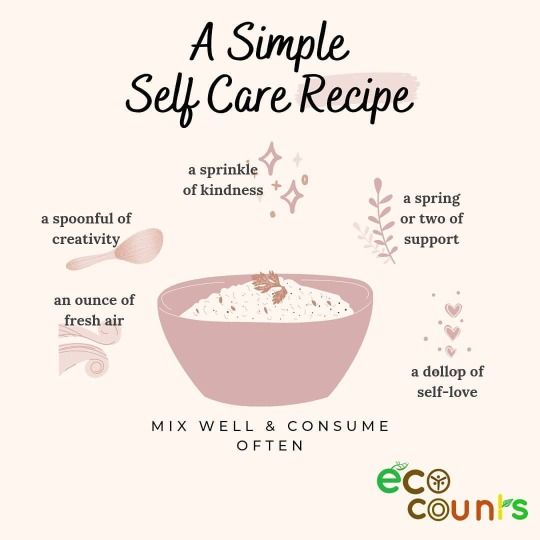
“It is so important to take time for yourself and find clarity. The most important relationship is the one you have with yourself.” Self care they say. Self love it seems. 🤞 Follow us 👉 @ecocounts 💚 to make living sustainable... with @ecocounts @ecocounts @ecocounts ❤️Like💫Share💯 Comment 👫Tag your friends . . . . . #selfcare #selflove #selfcaretips #sleflovequotes #loveyourself #loveyourselfquotes #ecocounts #ecofriendlyliving #lovenature #sustainableliving #simplerecipes #freshairandfreedom #kindness #spoonofcreativity #selfcarerecipe #takecareofyourself #greenactivist #greenliving #͏t͏o͏w͏a͏r͏d͏s͏p͏e͏a͏c͏e https://www.instagram.com/p/CNMe5ZsgJhO/?igshid=e3hbcoplf4yk
#selfcare#selflove#selfcaretips#sleflovequotes#loveyourself#loveyourselfquotes#ecocounts#ecofriendlyliving#lovenature#sustainableliving#simplerecipes#freshairandfreedom#kindness#spoonofcreativity#selfcarerecipe#takecareofyourself#greenactivist#greenliving#͏t͏o͏w͏a͏r͏d͏s͏p͏e͏a͏c͏e
0 notes
Photo
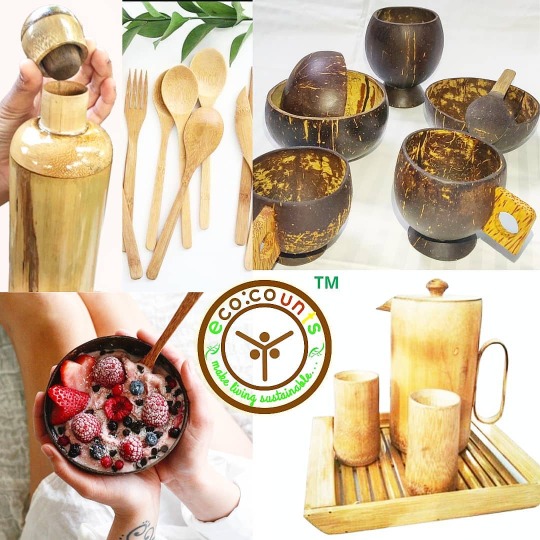
Find more Eco-friendly products and Sustainable living tips @ecocounts We have Bamboo, Coconut shell and many other eco-friendly based products. Our wide variety of cute kitchen wares and home decors will definitely interests you towards nature lifestyle. Follow us 👉 @ecocounts 💚 to make living sustainable... with @ecocounts @ecocounts @ecocounts ❤️Like💫Share💯 Comment 👫Tag your friends . . . . . #ecocounts #coconuts #greentips #bambooproducts #clayproducts #arecaplates #cocobowls #ecofriendlyproducts #zerowaste #zerowastelifestyle #towardsnature #sustainableliving #sustainability #greenshopping #environmentfriendly #naturelife #triballiving #zerowastetips #saynotoplastics #boobottles #ecofriendlyliving♻️ #earthygoals #greenactivist #towardszerowaste #shoplocally #shopresposibly #handmade #reducereuserecycle #supportfarmers #natureproducts (at Coimbatore, Tamil Nadu) https://www.instagram.com/p/CNCG8hHBjJF/?igshid=oz7yrntnkz2x
#ecocounts#coconuts#greentips#bambooproducts#clayproducts#arecaplates#cocobowls#ecofriendlyproducts#zerowaste#zerowastelifestyle#towardsnature#sustainableliving#sustainability#greenshopping#environmentfriendly#naturelife#triballiving#zerowastetips#saynotoplastics#boobottles#ecofriendlyliving♻️#earthygoals#greenactivist#towardszerowaste#shoplocally#shopresposibly#handmade#reducereuserecycle#supportfarmers#natureproducts
0 notes
Photo
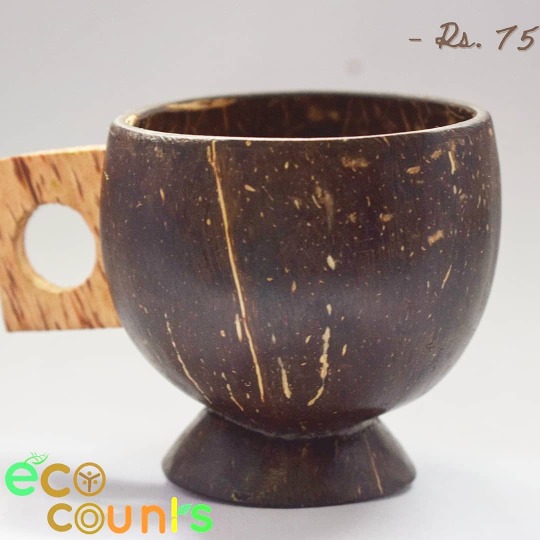
@ecocounts Launching our products, Coconut shell cups. Can place order with Retail price. Coconut shell cups☕ are a healthier alternative as these are chemical free unlike other materials. Biodegradable and environment friendly. 💚♻️✅ These cups are easy to clean for daily use. DM for bulk orders, we do considerably less wholesale price according to the quantity. Follow us 👉 @ecocounts 💚 to make living sustainable... with @ecocounts @ecocounts @ecocounts ❤️Like💫Share💯 Comment 👫Tag your friends . . . . . #ecocounts#coconuts #coconutbowls #cococups #cocobowls #ecofriendlyproducts #zerowaste #zerowastelifestyle #towardsnature #onearth #sustainableliving #sustainability #coconutshellproducts #greenshopping #environmentfriendly #triballiving #zerowastetips #saynotoplastics #ecofriendlyliving #ecolife #earthygoals #greenactivist #towardszerowaste #shoplocally #shopresposibly #handmade #reducereuserecycle #supportfarmers #coconutfarming #natureproducts (at Coimbatore, Tamil Nadu) https://www.instagram.com/p/CMy5uuwB0hN/?igshid=13gv689o3rtpi
#ecocounts#coconuts#coconutbowls#cococups#cocobowls#ecofriendlyproducts#zerowaste#zerowastelifestyle#towardsnature#onearth#sustainableliving#sustainability#coconutshellproducts#greenshopping#environmentfriendly#triballiving#zerowastetips#saynotoplastics#ecofriendlyliving#ecolife#earthygoals#greenactivist#towardszerowaste#shoplocally#shopresposibly#handmade#reducereuserecycle#supportfarmers#coconutfarming#natureproducts
0 notes
Photo
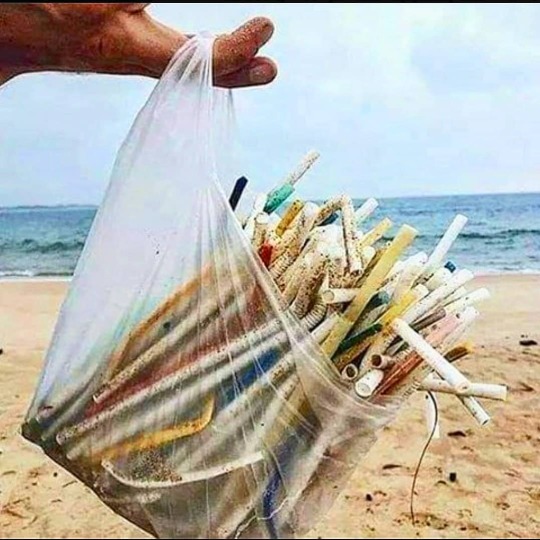
" It's only one Straw! " - Said 8 Billion people. Straws are particularly prone to ending up in our waterways, and ultimately the oceans. Most plastic straws simply break into ever-smaller particles, releasing chemicals into the soil, air, and water that are harmful to animals, plants, people, and the environment.🌐 It is projected that by 2050 there will be more plastic in the ocean than fish (by weight). 🥺 Please do consider using reusable straws, and take with you💚 . . . Follow us 👉 @ecocounts to make living sustainable... with @ecocounts ❤️Like💫Share💯 Comment 👫Tag your friends . . . . . #ecocounts #saynotoplastics #plasticstraws #greentips #gogreen #ecofriendlyproducts #zerowaste #zerowastelifestyle #towardsnature #onearth #sustainableliving #saveearth #sustainability #bamboostraws #boostraws #ecoshop #greenshopping #environmentfriendly #naturelife #triballiving #zerowastetips #ecofriendlyliving #ecolife #earthygoals #greenactivist #towardszerowaste #shoplocally #shopresposibly #handmade (at Planet Earth) https://www.instagram.com/p/CMtuh_0h0oT/?igshid=wgex5jtl3m2p
#ecocounts#saynotoplastics#plasticstraws#greentips#gogreen#ecofriendlyproducts#zerowaste#zerowastelifestyle#towardsnature#onearth#sustainableliving#saveearth#sustainability#bamboostraws#boostraws#ecoshop#greenshopping#environmentfriendly#naturelife#triballiving#zerowastetips#ecofriendlyliving#ecolife#earthygoals#greenactivist#towardszerowaste#shoplocally#shopresposibly#handmade
0 notes
Photo

@ecocounts Bamboo Spoons Bamboo based products Follow for more 👉@ecocounts to make living sustainable... with @ecocounts @ecocounts @ecocounts . . . . #ecocounts #boospoons #bamboospoons #sustainable #ecofriendly #sustainability #zerowaste #sustainableliving #handmade #organic #sustainableproducts #recycle #plasticfree #plantbased #vegan #sustainabledesign #biodegradable #shoplocal #bambooproducts #shopbamboo #circulareconomy #bamboodesign #reducereuserecycle #instagood #supportfarmers #farming #farmers (at Tamilnadu) https://www.instagram.com/p/CMjcr-MhVNF/?igshid=138ojn0wku4cf
#ecocounts#boospoons#bamboospoons#sustainable#ecofriendly#sustainability#zerowaste#sustainableliving#handmade#organic#sustainableproducts#recycle#plasticfree#plantbased#vegan#sustainabledesign#biodegradable#shoplocal#bambooproducts#shopbamboo#circulareconomy#bamboodesign#reducereuserecycle#instagood#supportfarmers#farming#farmers
0 notes
Photo
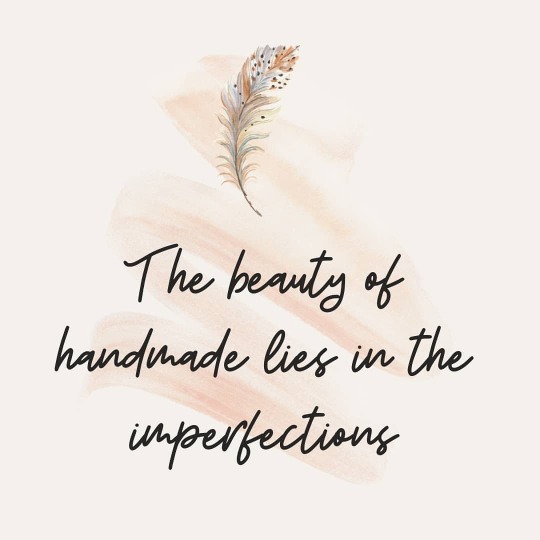
✋Each handmade product is unique Unlike gifts that are mass-produced, you will often find unique differences in each handmade item, which really makes the product and the purchase very special. Nobody in the whole world will have exactly the same item at home, and that’s pretty unique! A lot of our handmade gifts are also made to order and personalised to your specification.🖐️ Follow us 👉 @ecocounts to make living sustainable... with @ecocounts @ecocounts @ecocounts . . . . . #handmade #artisanmade #handmadeproducts #handmadeindia #ecocounts #indianhandicraft #onearth #handcraftdesigns #organickrafts #indiandesigns #tribelife #ecofriendlyproducts #handcrafted #handcraftedgifts https://www.instagram.com/p/CMTwAp-gvwy/?igshid=1cllf0sbpc2ss
#handmade#artisanmade#handmadeproducts#handmadeindia#ecocounts#indianhandicraft#onearth#handcraftdesigns#organickrafts#indiandesigns#tribelife#ecofriendlyproducts#handcrafted#handcraftedgifts
0 notes
Photo
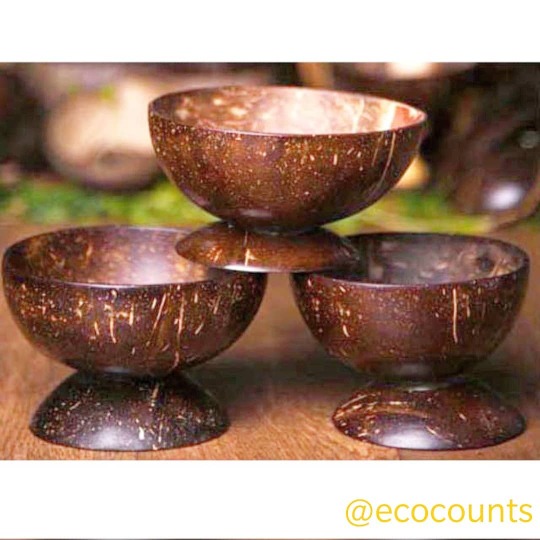
@ecocounts The Coconut Shell Ice cream Bowls/cups featured by hand carved coconut shell. 🍧 The bowls can be used for serving Ice creams, nuts, desserts, sweets, etc,🍨. It makes a great gift🎁 for housewarming, weddings, anniversaries, birthdays, and more. ✓ A handmade 🖐️ Coconut Bowls made from reclaimed coconut shells. ✓ Eco-friendly 🌴 Ice cream cups are perfect for use as serving desserts. ✓ Smooth inside and outside 🐚 and also they are cut, cleaned and sanded. Follow us 👉@ecocounts to Make living sustainable... with @ecocounts . . . . #ecocounts #coconuts #cococups #sustainable #ecofriendlyproducts #sustainability #zerowaste #sustainableliving #handmade #ecofriendly #organic #ecoshop #sustainableproducts #recycle #plasticfree #plantbased #vegan #sustainabledesign #biodegradable #shoplocal #coconutbowls #coconutproducts #circulareconomy #greeshopping #reducereuserecycle #supportfarmers #agriculturefuture #ecocoproducts #ecostore #naturalproducts (at India) https://www.instagram.com/p/CMMVVayAMMh/?igshid=1cb8d0j6qdu93
#ecocounts#coconuts#cococups#sustainable#ecofriendlyproducts#sustainability#zerowaste#sustainableliving#handmade#ecofriendly#organic#ecoshop#sustainableproducts#recycle#plasticfree#plantbased#vegan#sustainabledesign#biodegradable#shoplocal#coconutbowls#coconutproducts#circulareconomy#greeshopping#reducereuserecycle#supportfarmers#agriculturefuture#ecocoproducts#ecostore#naturalproducts
0 notes
Photo
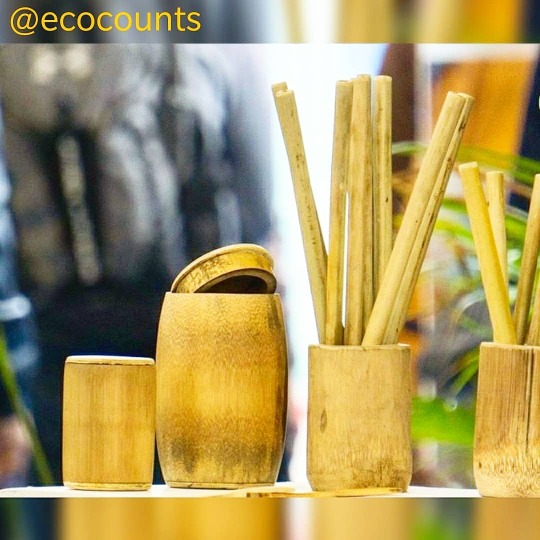
@ecocounts Bamboo straws/ Bamboo products. Enhance your dining experience by adding bamboo straws for the drink. 🍹🍸 Reusable, eco-friendly, biodegradable straws. Enter nature by encouraging nature products. Follow us 👉@ecocounts to Make living sustainable... with @ecocounts @ecocounts @ecocounts . . . . #ecocounts #bamboostraws #boostraws #sustainable #ecofriendlyproducts #sustainability #zerowaste #sustainableliving #handmade #ecofriendly #organic #ecoshop #sustainableproducts #recycle #plasticfree #plantbased #vegan #sustainabledesign #biodegradable #shoplocal #bambooproducts #circulareconomy #greeshopping #reducereuserecycle #supportfarmers #farming #farmers #ecocoproducts #ecostore (at Tamil Nadu) https://www.instagram.com/p/CMEPrYXgy9T/?igshid=539v8eqjwumu
#ecocounts#bamboostraws#boostraws#sustainable#ecofriendlyproducts#sustainability#zerowaste#sustainableliving#handmade#ecofriendly#organic#ecoshop#sustainableproducts#recycle#plasticfree#plantbased#vegan#sustainabledesign#biodegradable#shoplocal#bambooproducts#circulareconomy#greeshopping#reducereuserecycle#supportfarmers#farming#farmers#ecocoproducts#ecostore
0 notes